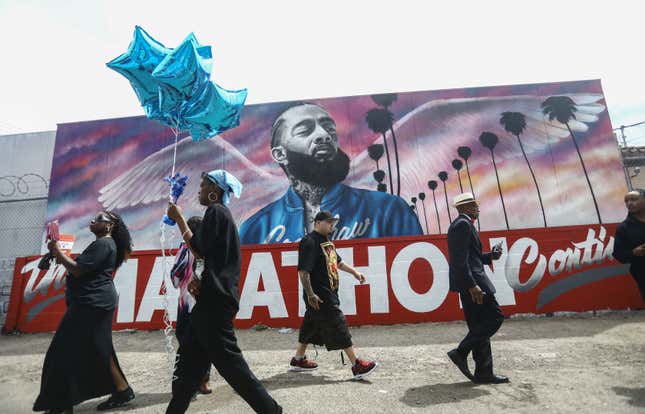
Despite being hailed by the Los Angeles Police Department as a community leader who invested in the youth and created countless opportunities for residents of South Los Angeles, Nipsey Hussle was reportedly under investigation for his gang affiliations prior to his killing earlier this year.
The New York Times reports that the LAPD and the city attorney’s office opened the investigation, which focused on the alleged gang activity of the strip mall where his Marathon Clothing store—which has since been closed—was located.
These investigations are more commonly known as abatement or nuisance probes and have a longstanding history of being utilized by the city to either seize property or evict tenants in order to diminish gang activity.
From the New York Times:
The city attorney’s office has called the abatement program a critical weapon in law enforcement’s “arsenal against gangs.” Rather than targeting individuals with criminal charges, the program focuses on public and private spaces—the physical territories that are critical to a gang’s reach in a neighborhood.
In recent years, the city attorney, Mike Feuer, has filed numerous lawsuits against property owners for allowing gang activity, including at a duplex in South Los Angeles where prosecutors said there was a “toxic combination of gangs, guns and drugs”; and a motel in Van Nuys that officials said was rife with prostitution, drugs and violence.
With these types of investigations providing a far less intrusive alternative than civil restraining orders, they’ve become the weapon of choice by the city to eliminate gang activity in Los Angeles, though injunctions of this nature were banned by a federal judge last year due to their violations of due process rights, the Times notes.
If you recall, during Hussle’s televised memorial in April, his brother Samiel “Blacc Sam” Asghedom revealed that the city had plans in motion to evict Hussle and his business partners from the strip mall.
“I don’t know if anybody knows, but we had a 30-day notice and they were kicking us out of all the businesses we owned in the lot,” Asghedom said at the time. In order to circumvent eviction, Hussle and his associates purchased the property from their former landlords for $2.5 million, according to the New York Times.
There is no official word as to what sparked the investigation, but reportedly it remains open despite the city attorney’s office declining to provide confirmation.



